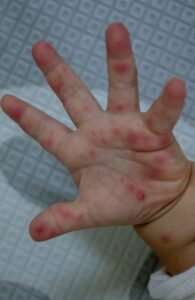Hand, Foot, and Mouth Disease (HFMD) is a common childhood illness that typically affects children under five, although it can also affect older kids and adults. It's important for parents to recognize the different stages and forms of HFMD to provide the appropriate care. Here's a guide to understanding the different types and managing the condition effectively at home.
Understanding HFMD: The Three Forms
HFMD can vary in severity. There are three main types, each with its own symptoms and level of severity. Knowing these can help you determine how to manage your child’s illness and when to seek medical attention.
1. Mild Form of HFMD:
Description:
This is the least severe form of HFMD. Most children recover completely without any complications.
Symptoms:
- Fever: Often the first sign of HFMD.
- Rash: Red spots or blisters appear, typically on the hands, feet, and sometimes on the body.
- Mouth Ulcers: Painful sores can develop in the mouth, making eating and drinking uncomfortable.
Management at Home:
- Offer fever-reducing medications such as acetaminophen or ibuprofen.
- Encourage fluids to stay hydrated, especially if the child has mouth sores.
- Use soothing mouth gels for pain relief.
- Keep your child home to avoid spreading the disease.
Most children with the mild form of HFMD recover fully within 7-10 days without any special treatment.
2. Severe Form of HFMD:
Description:
This form affects the nervous system, and can lead to more severe complications.
Symptoms:
- Headaches and Vomiting: Common signs of the nervous system being affected.
- Muscle Weakness: Children may feel weak or have difficulty walking.
- Severe Fatigue: Children can become extremely tired.
Management at Home:
If your child develops any of these symptoms, it's important to seek medical advice immediately. Severe HFMD can lead to complications like encephalitis (inflammation of the brain) or meningitis, which can be life-threatening.
3. Critical Form of HFMD:
Description:
This is the most serious and dangerous form of HFMD, affecting multiple organs in the body.
Symptoms:
- Respiratory Issues: Rapid breathing and difficulty breathing.
- Increased Heart Rate: The child’s heart rate may rise significantly.
- Heart and Lung Failure: This can lead to life-threatening conditions.
Management at Home:
This form of HFMD requires urgent medical care. If your child shows signs of critical HFMD, such as rapid breathing or changes in heart rate, seek emergency medical help immediately. Hospitalization may be necessary, and doctors will provide supportive care such as fluids and respiratory support.
Key Takeaways for Parents:
- Recognize the Symptoms: Knowing the type of HFMD your child has will guide your treatment approach.
- Seek Medical Help When Necessary: Don’t hesitate to contact your healthcare provider if symptoms worsen or if the child is not recovering.
- Manage Mild Cases at Home: Most children with mild HFMD will recover with rest, hydration, and fever management.
- Stay Safe and Prevent Spread: Isolate the infected child from others to avoid spreading the virus.
Frequently Asked Questions (FAQs)
1. How long does HFMD last in children?
The illness typically lasts 7 to 10 days. Most children will recover without any complications, but you should continue monitoring for any changes in their condition.
2. Can HFMD be prevented?
Good hygiene practices, such as regular hand washing and disinfecting toys and surfaces, can help reduce the risk of HFMD. However, because it's a viral infection, complete prevention is difficult.
3. When should I take my child to the doctor?
If your child shows signs of severe or critical HFMD, or if symptoms don’t improve after a few days, consult your doctor. If you notice severe headache, vomiting, muscle weakness, or breathing difficulties, seek medical attention immediately.
4. Can my child go to school if they have HFMD?
It’s best to keep your child home until they are no longer contagious. HFMD is highly contagious, especially in the first week of illness.
5. Is there a vaccine for HFMD?
Currently, there is no vaccine for HFMD. The best preventive measures include good hygiene and avoiding close contact with infected individuals.












